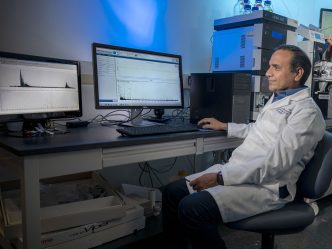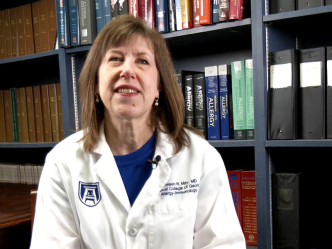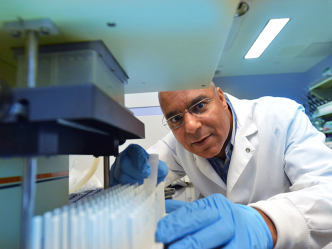The number one way parents should be preparing students now to return to school during the COVID-19 pandemic is teaching them to wear a mask every time they leave home, an Augusta pediatrician says.
“The biggest thing is getting kids to understand that there’s no question about whether we wear it, and that it just becomes part of the routine. It’s just what we do,” says Dr. April Hartman, chief of the Division of General Pediatrics and Adolescent Medicine in the Department of Pediatrics at the Medical College of Georgia and the Children’s Hospital of Georgia. “If you can master that, you’re going to be far ahead when school starts.”
She recommends being forthright and explaining to children that mask wearing is less about them and more about caring for others. “Kids are actually pretty reasonable if you tell them why. They tend to have pretty soft hearts,” she says. “For instance, you can tell them ‘If you are sick and you don’t know it and you get someone else sick and they go home and their grandparent lives with them, their grandparent could end up in the hospital or even die.’ Let them know this is serious and there’s a reason we’re doing this.”
Children tend to replicate other’s behavior, Hartman also notes, so parents should be setting the example now.
Parents should also prepare children for a different school atmosphere than the one they left in March. The new normal may include things like teachers changing rooms instead of students, lunch served in classrooms and activities like dance classes and physical education will have students spaced apart and may be held outside. “If there’s something you’re doing where you are going to be expressing more respiratory droplets, like dancing for example, it will need to be outside,” she says.
Returning to school during a pandemic also comes with the usual pains of the ending those lazy dog days of summer. More traditional ways parents can get kids ready to head back to the classroom include making sure they get back on a normal sleep routine.
“Reestablish that bedtime now. Get them used to going to bed earlier, getting up earlier,” Hartman says. “We also strongly recommend no screen time an hour before bed. The blue light in the background stimulates the brain, which makes falling asleep harder. They can read or listen to music, but the screens should be off.”
Children should also spend some time each day reading for pleasure, she says, because it not only increases their vocabulary, but broadens their minds and improves reading comprehension.
“When they do go back and have to read school assignments, they have the comprehension part down because they’ve been practicing by reading something they enjoy,” she explains.
Parents can help kids get used to practicing other skills like math again in one simple step – give them their own money. “Give them an allowance and make them pay for things,” Hartman says. “That will help them learn to subtract. If they’re old enough to be learning percentages, let them figure out sales tax.”
It’s not just the kids that need to get prepared for a new school year. With it comes busier schedules for parents too. Hartman encourages parents to have their children help them with morning and evening routines by helping plan out their week.
“Maybe it’s that they help you make a weekly dinner menu and decide what they want to take for lunch that week,” she says. “Maybe it’s planning their clothes out for the week and hanging up five outfits. Look at the things that take your time and get them to help.”
She recommends the American Academy of Pediatrics www.healthychildren.org as another useful resource for parents, with advice on topics ranging from how to talk to children about COVID-19 to bullying and other timely topics.
Parents can and should check in with their child’s pediatrician if they have concerns about sending them back to school, especially parents of children with chronic conditions, like asthma or diabetes for instance, Hartman says. Most pediatricians are offering virtual visits for those who need extra reassurance.
Children’s Hospital of Georgia Pediatric Clinics can be reached at 706-721-KIDS (5437).
 Augusta University
Augusta University





